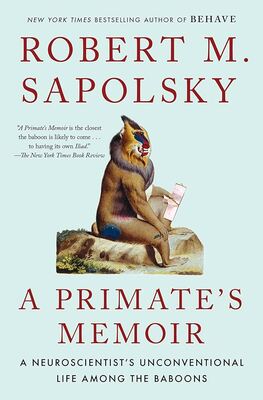
Along with the occasional goat eating is a strong cultural prohibition: it is very bad luck, very bad luck, indeed, for men to be seen by women to be eating meat. How convenient—thus, only the guys get to eat meat in this protein-starved culture.
When male baboons who are getting along well run into each other and want to say howdy, they yank on each other’s penises.
Now, it’s not entirely clear to me why we laud the predators so much and so disdain the scavengers, since most of us are hardening our arteries wolfing down carcasses that someone else killed, but that is our bias.
The Masai use them to suture people—bad cut, and someone grabs an army ant, holds the two sides of the cut together, lets the pissed-off ant sink its pincers in, and, quickly, twists off the body, leaving rows of ant head sutures in place.
I also observed that in a stable hierarchy, the dominant males weren’t the ones with the highest testosterone levels. Instead, it was the jerky subadult males starting fights who had the highest levels.
For all those years, I had been focusing on the idea that rank helped determine the health of these animals, that lower-ranking males were more at risk for a variety of stress-related diseases. Rank was destiny, case closed. But my more recent studies suggested that there was more to a baboons life than his rank. Your physiological profile was indeed influenced by rank, but, it turned out, even more important than that was the sort of society in which the rank occurred—for example, the hormonal profile of a high-ranking male in a stable hierarchy was extremely different during die unstable years. And while rank was important to physiology, an even more significant factor seemed to be whether you had the means to cope when times were tough, whether you were socially affiliated. Thus, independent of rank, males who did the most social grooming and sat in contact with other animals most frequently had the lowest stress hormone levels.
Masai believe that all cows on earth belong to the Masai and have inadvertently wandered off into someone else’s hands; the job of the warrior is to rectify that unfortunate situation.
While the rest of the developing world succumbs to emulating the tawdriest lowest common denominators of Western culture, part of the beauty, the majesty, of these people and their related nomadic tribes has been their capacity to pass through other cultures for centuries and to emerge unchanged, uncompromised. And what became clear to me was that the prerequisite for such immunity from other cultures is to have utter contempt for anyone who is not Masai.